| Listing 1 - 10 of 115 | << page >> |
Sort by
|
Book
ISBN: 0128170875 0128170867 9780128170878 9780128170861 Year: 2020 Publisher: Amsterdam, Netherlands : Elsevier,
Abstract | Keywords | Export | Availability | Bookmark
 Loading...
Loading...Choose an application
- Reference Manager
- EndNote
- RefWorks (Direct export to RefWorks)
Book
ISBN: 0128178825 0128178833 9780128178836 9780128178829 Year: 2021 Publisher: London : Academic Press, an imprint of Elsevier,
Abstract | Keywords | Export | Availability | Bookmark
 Loading...
Loading...Choose an application
- Reference Manager
- EndNote
- RefWorks (Direct export to RefWorks)
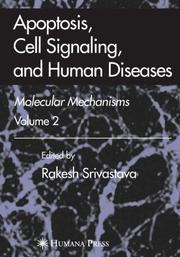
ISBN: 1280832606 9786610832606 1597452009 1588296776 Year: 2007 Publisher: Totowa, N.J. : Humana Press,
Abstract | Keywords | Export | Availability | Bookmark
 Loading...
Loading...Choose an application
- Reference Manager
- EndNote
- RefWorks (Direct export to RefWorks)
Apoptosis, Cell Signaling, and Human Diseases: Molecular Mechanisms, Volumes 1 and 2, present a concise synthesis of recent developments in the understanding of both cell survival and apoptotic pathways. Particular attention is given to apoptosis in human diseases, such as different forms of cancer and neurodegenerative diseases. These comprehensive volumes integrate the most innovative and current findings from several related disciplines of scientific research, including pathology, genetics, virology, cell biology, immunology, and molecular biology. Volume 1 is divided into two sections: “Malignant Transformation and Metastasis” and “Molecular Basis of Disease Therapy.” Volume 2 follows a similar structure and is divided into sections entitled “Kinases and Phosphate” and “Molecular Basis of Cell Death.” All of the contributors are at the forefront of scientific discovery, and the reviews they present systemically examine the most exciting and innovative aspects of their particular areas of expertise. Researchers will find these volumes of major benefit as they search for novel and more effective treatments for human diseases.
Apoptosis. --- Pathology, Molecular. --- Cellular signal transduction. --- Cellular information transduction --- Information transduction, Cellular --- Signal transduction, Cellular --- Bioenergetics --- Cellular control mechanisms --- Information theory in biology --- Molecular pathology --- Molecular biology --- Physiology, Pathological --- Cell death
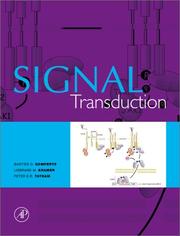
ISBN: 0122896319 0122896327 9780080541181 0080541186 9780122896323 1281070629 9786611070625 9780122896316 9781281070623 Year: 2002 Publisher: San Diego, Calif. : Academic Press,
Abstract | Keywords | Export | Availability | Bookmark
 Loading...
Loading...Choose an application
- Reference Manager
- EndNote
- RefWorks (Direct export to RefWorks)
Signal Transduction is a well-illustrated, coherent look at cellular signaling processes. Beginning with the basics, it explains how cells respond to external cues, hormones, growth factors, cytokines, cell surfaces, etc., and then shows how these inputs are integrated and coordinated. The extensive color artwork provides the reader with a clearer comprehension of key topics, and margin notes are incorporated to highlight milestones in the evolution of signal transduction. This book serves as an invaluable resource for advanced undergraduates, graduate researchers, and established scien
Human physiology --- fysiologie --- moleculaire biologie --- Cellular signal transduction. --- Transduction du signal cellulaire --- ELSEVIER-B EPUB-LIV-FT --- Cellular signal transduction --- Cellular information transduction --- Information transduction, Cellular --- Signal transduction, Cellular --- Bioenergetics --- Cellular control mechanisms --- Information theory in biology --- SIGNALS --- MONOGRAPHS --- TRANSDUCTION
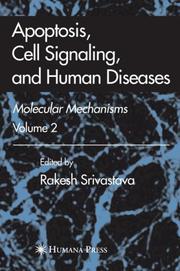
ISBN: 1280832592 9786610832590 1597451991 1588298825 Year: 2007 Publisher: Totowa, N.J. : Humana Press,
Abstract | Keywords | Export | Availability | Bookmark
 Loading...
Loading...Choose an application
- Reference Manager
- EndNote
- RefWorks (Direct export to RefWorks)
Apoptosis, Cell Signaling, and Human Diseases: Molecular Mechanisms, Volumes 1 & 2, present a concise synthesis of recent developments in the understanding of both cell survival and apoptotic pathways. Particular attention is given to apoptosis in human diseases, such as different forms of cancer and neurodegenerative diseases. These comprehensive volumes integrate the most innovative and current findings from several related disciplines of scientific research, including pathology, genetics, virology, cell biology, immunology, and molecular biology. Volume 1 is divided into two sections: "Malignant Transformation and Metastasis" and "Molecular Basis of Disease Therapy." Volume 2 follows a similar structure and is divided into sections entitled "Kinases and Phosphate" and "Molecular Basis of Cell Death." All of the contributors are at the forefront of scientific discovery, and the reviews they present systemically examine the most exciting and innovative aspects of their particular areas of expertise. Researchers will find these volumes of major benefit as they search for novel and more effective treatments for human diseases.
Apoptosis. --- Pathology, Molecular. --- Cellular signal transduction. --- Cellular information transduction --- Information transduction, Cellular --- Signal transduction, Cellular --- Bioenergetics --- Cellular control mechanisms --- Information theory in biology --- Molecular pathology --- Molecular biology --- Physiology, Pathological --- Cell death
Book
ISBN: 1498774237 1351650610 1315154587 1498774229 9781351650618 Year: 2018 Publisher: Milton : Chapman and Hall/CRC,
Abstract | Keywords | Export | Availability | Bookmark
 Loading...
Loading...Choose an application
- Reference Manager
- EndNote
- RefWorks (Direct export to RefWorks)
All hollow organs, such as blood vessels, the gastrointestinal tract, airways, male and female reproductive systems, and the urinary bladder are primarily composed of smooth muscle. Such organs regulate flow, propulsion and mixing of luminal contents and storage by the contraction and relaxation of smooth muscle cells. Smooth muscle cells respond to numerous inputs, including pressure, shear stress, intrinsic and extrinsic innervation, hormones and other circulating molecules, as well as autocrine and paracrine factors. This book is a review of smooth muscle cell regulation in the cardiovascular, reproductive, GI, and other organ systems with emphasis on calcium and receptor signaling.
Smooth muscle --- Cellular signal transduction. --- Cellular information transduction --- Information transduction, Cellular --- Signal transduction, Cellular --- Bioenergetics --- Cellular control mechanisms --- Information theory in biology --- Nonstriated muscle --- Unstriated muscle --- Muscles --- Physiology. --- Mitochondria structure and position --- local control --- calcium signals --- smooth muscle cells
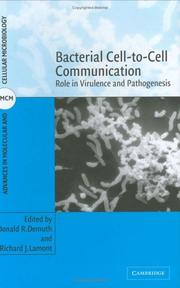
ISBN: 9780511541506 9780521846387 0511135084 9780511135088 0521846382 0511137257 9780511137259 0511134355 9780511134357 0511541503 1107152372 1280347082 9786610347087 051120146X 0511311672 9781107152373 9781280347085 6610347085 9780511311673 Year: 2006 Publisher: Cambridge ; New York : Cambridge University Press,
Abstract | Keywords | Export | Availability | Bookmark
 Loading...
Loading...Choose an application
- Reference Manager
- EndNote
- RefWorks (Direct export to RefWorks)
Many bacterial diseases are caused by organisms growing together as communities or biofilms. These microorganisms have the capacity to coordinately regulate specific sets of genes by sensing and communicating amongst themselves utilizing a variety of signals. This book examines the mechanisms of quorum sensing and cell-to-cell communication in bacteria and the roles that these processes play in regulating virulence, bacterial interactions with host tissues, and microbial development. Recent studies suggest that microbial cell-to-cell communication plays an important role in the pathogenesis of a variety of disease processes. Furthermore, some bacterial signal molecules may possess immunomodulatory activity. Thus, understanding the mechanisms and outcomes of bacterial cell-to-cell communication has important implications for appreciating host-pathogen interactions and ultimately may provide new targets for antimicrobial therapies that block or interfere with these communication networks.
Bacteria --- Cell interaction. --- Cellular signal transduction. --- Cellular information transduction --- Information transduction, Cellular --- Signal transduction, Cellular --- Bioenergetics --- Cellular control mechanisms --- Information theory in biology --- Cell-cell interaction --- Cell communication --- Cellular communication (Biology) --- Cellular interaction --- Intercellular communication --- Bacterial physiology --- Physiology --- Physiology.
Book
ISBN: 0323901956 0323901964 9780323901963 9780323901956 Year: 2022 Publisher: London, England ; San Diego, California : Elsevier,
Abstract | Keywords | Export | Availability | Bookmark
 Loading...
Loading...Choose an application
- Reference Manager
- EndNote
- RefWorks (Direct export to RefWorks)
The content is presented in four main section. The first explores the foundations of Cell Movement, including overviews of cellular structure, signaling, physiology, motion-related proteins, and the interface with the cellular membrane. The second part covers the biological aspects of cellular movement, starting with chemical and mechanical sensing, describing the types of cell movement, mechanics at cell level, cell physiology, collective behavior, and the connections with the extracellular matrix. The following chapters provide an overview of the molecular machinery involved and cell-type specific movement. The third part of the book is dedicated to the translational aspects of cell movement, highlighting the key conditions associated with cell movement dysfunction, like cell invasion in cancer, wound healing, developmental issues, neurological dysfunctions, and immune response. The final part of the book covers key methods and modeling tools for cell movement research, including predictive mathematical models, in vitro and in vivo methods, biophysical and bioinformatics tools.
Cellular signal transduction. --- Cell migration. --- Cellular information transduction --- Information transduction, Cellular --- Signal transduction, Cellular --- Bioenergetics --- Cellular control mechanisms --- Information theory in biology --- Migration of cells --- Cytology --- Cell Movement --- Signal Transduction --- physiology --- Cell Movement. --- Signal Transduction. --- physiology.
Book
ISBN: 3031083083 3031083091 Year: 2022 Publisher: Cham, Switzerland : Springer International Publishing,
Abstract | Keywords | Export | Availability | Bookmark
 Loading...
Loading...Choose an application
- Reference Manager
- EndNote
- RefWorks (Direct export to RefWorks)
Cardiovascular system --- Cellular signal transduction. --- Diseases. --- Cellular information transduction --- Information transduction, Cellular --- Signal transduction, Cellular --- Bioenergetics --- Cellular control mechanisms --- Information theory in biology --- Cardiovascular diseases --- Sistema cardiovascular --- Malalties cardiovasculars
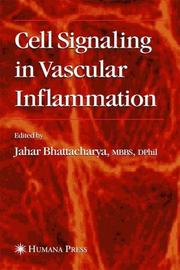
ISBN: 1280359161 9786610359165 1592599095 1588295257 1617376191 Year: 2005 Publisher: Totowa, N.J. : Humana Press,
Abstract | Keywords | Export | Availability | Bookmark
 Loading...
Loading...Choose an application
- Reference Manager
- EndNote
- RefWorks (Direct export to RefWorks)
Although inflammatory disease of the vascular bed of the lung is a major cause of morbidity and mortality in both adult and pediatric age groups, the importance of vascular biology to its understanding, and in developing novel therapeutics, has been overlooked. In Cell Signaling in Vascular Inflammation, leading basic and clinical researchers review the signal transduction mechanisms responsible for lung inflammation, including vascular hyperpermeability, white cell accumulation, and vascular remodeling. The authors cut across disciplines to bring together a broad-based presentation of inflammatory challenge, both in the initial phases of the inflammatory response, as well as in the more prolonged phase of genomic involvement. Authoritative and state-of-the-art, Cell Signaling in Vascular Inflammation offers physiologists, molecular and cell biologists, and pharmaceutical scientists a comprehensive survey of the signal transduction pathways in lung vascular cells that illuminates not only the processes of lung inflammation, but also the potential for developing new therapeutic strategies to combat inflammatory lung disease.
Vasculitis. --- Cellular signal transduction. --- Inflammation --- Mediators. --- Medicine. --- Vascular surgery. --- Medicine & Public Health. --- Vascular Surgery. --- Vascular surgery --- Clinical sciences --- Medical profession --- Human biology --- Life sciences --- Medical sciences --- Pathology --- Physicians --- Inflammatory mediators --- Mediators of inflammation --- Biomolecules --- Cellular information transduction --- Information transduction, Cellular --- Signal transduction, Cellular --- Bioenergetics --- Cellular control mechanisms --- Information theory in biology --- Angiitis --- Blood-vessels --- Vasculitides --- Diseases --- Surgery.
| Listing 1 - 10 of 115 | << page >> |
Sort by
|

 Search
Search Feedback
Feedback About UniCat
About UniCat  Help
Help News
News